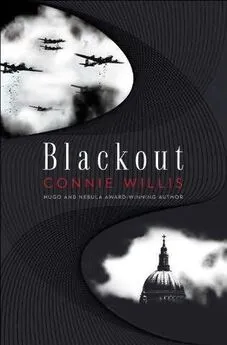Connie Willis - Blackout
- Название:Blackout
- Автор:
- Жанр:
- Издательство:неизвестно
- Год:неизвестен
- ISBN:нет данных
- Рейтинг:
- Избранное:Добавить в избранное
-
Отзывы:
-
Ваша оценка:
Connie Willis - Blackout краткое содержание
In her first novel since 2002, Nebula and Hugo award-winning author Connie Willis returns with a stunning, enormously entertaining novel of time travel, war, and the deeds—great and small—of ordinary people who shape history. In the hands of this acclaimed storyteller, the past and future collide—and the result is at once intriguing, elusive, and frightening.
Oxford in 2060 is a chaotic place. Scores of time-traveling historians are being sent into the past, to destinations including the American Civil War and the attack on the World Trade Center. Michael Davies is prepping to go to Pearl Harbor. Merope Ward is coping with a bunch of bratty 1940 evacuees and trying to talk her thesis adviser, Mr. Dunworthy, into letting her go to VE Day. Polly Churchill’s next assignment will be as a shopgirl in the middle of London’s Blitz. And seventeen-year-old Colin Templer, who has a major crush on Polly, is determined to go to the Crusades so that he can “catch up” to her in age.
But now the time-travel lab is suddenly canceling assignments for no apparent reason and switching around everyone’s schedules. And when Michael, Merope, and Polly finally get to World War II, things just get worse. For there they face air raids, blackouts, unexploded bombs, dive-bombing Stukas, rationing, shrapnel, V-1s, and two of the most incorrigible children in all of history—to say nothing of a growing feeling that not only their assignments but the war and history itself are spiraling out of control.
Blackout - читать онлайн бесплатно полную версию (весь текст целиком)
Интервал:
Закладка:
He wasn’t between two rocks, though. It was a single rock, with a sand-filled hollow carved out of the middle by the tide, but he’d been right about its hiding him-and the shimmer-from the beach. He looked at the Bulova on his wrist. It said eleven-twenty. He’d set it for five just before he came through, which meant he’d been here more than six hours. No wonder he felt like he’d been on this beach for eons. He had.
And he couldn’t see any particular reason why. He’d assumed someone had been in the vicinity at five, but there were no boats offshore or footprints on the beach. There weren’t any beach fortifications either, no wooden stakes along the waterline to slow landing craft, no barbed wire. Jesus, I hope the slippage didn’t send me through in January. Or in 1938.
The only way to find out was to get off the beach. Which he needed to do anyway. If he was when and where he was supposed to be, the locals would think he was a German spy who’d just been put ashore by a U-boat and arrest him. Or shoot him. He needed to get out of here before full light. He put on his coat, brushed the sand off his trousers, peered over the rock in both directions, and then climbed out of the rock. He turned and looked up at the cliff. There was no one on top of it-at least the part he could see-and no way off the beach. And no way to tell which way Dover lay. He flipped a mental coin and set off toward the northern end, keeping close under the cliff so he couldn’t be seen from above and looking for a path.
A few hundred yards from the rock he found one-a narrow zigzag cut into the chalk cliff. He sprinted up it, halting just short of the top to reconnoiter, but there was no one on its grassy top. He turned and looked out across the Channel, but even from up here he couldn’t spot any ships. And no sign of smoke on the horizon.
And no farmhouses, no livestock, not even any fences, only the white gravel road he’d thought he might be on when he came through last night. I’m in the middle of nowhere, he thought.
But he couldn’t be. The entire southeast coast of England had been dotted with fishing villages. There’s got to be one somewhere near here, he thought, heading south to see what lay beyond the other headland. But if so, why hadn’t he heard any church bells last night or this morning? Let’s just hope there is a village. And that it’s within walking distance.
It was. A huddle of stone buildings lay immediately beyond the headland, and beyond them a quay with a line of masted boats. There was a church, too. With a bell tower. The cliffs must have cut off the sound of the bells. He started down the road toward the village, keeping an eye out for a car he could hitch a ride in or, if he was lucky, the bus to Dover, but no vehicle of any kind came along the road the entire way.
It’s too early to be up and around, he thought, and that went for the village, too. Its lone shop was closed, and so was the pub-the Crown and Anchor-and no one was on the street. He walked down to the quay, thinking the fishermen would likely be up, but there was no one there either. And though he walked out beyond the last house, there was no train station. And no bus stop. He walked back to the shop and peered in through the window, looking for either a bus schedule or something that would tell him which village this was. If he was really six miles north of Dover, it might be faster to walk it than wait for a bus. But the only sign he could see was a schedule for the Empress Cinema, which was showing Follow the Fleet from May fifteenth to the thirty-first. May was the right month, but Follow the Fleet had come out in 1937.
He went on to the Crown and Anchor and tried the door. It opened onto a dark hall. “Hello? Are you open?” he called, and stepped inside.
At the end of the hallway was a stairway and a door leading into what must be the pub room. He could just make out settles and a bar in the near-darkness. An old-fashioned telephone, the kind with an earpiece on a cord, hung on the wall opposite the stairs, and next to it was a grandfather clock. Mike squinted at it. Five to eight. He hadn’t come through at five, then. He set his Bulova, glad there was no one to see how clumsy he was at it, and then looked around for a bus schedule. On a small table next to the clock lay several letters. Mike bent over them, squinting to read the address of the top one. “Saltram-on-Sea, Kent.”
That can’t be right, he thought. Saltram-on-Sea was thirty miles south of Dover, not six miles north. The letter must be one that was being mailed to Saltram-on-Sea. But the two-cent stamp in the corner had been canceled, and the return address was Biggin Hill Airfield, which this obviously wasn’t. He glanced cautiously up the narrow wooden stairs and then picked up the letters and shuffled through them. They were all to Saltram-on-Sea, and, clinching it, one of them was addressed to the Crown and Anchor.
Jesus, that meant there’d been locational slippage, and he’d have to take the bus, which meant he had to find out immediately when it went and where it stopped. “Hello?” he called loudly up the stairs and into the pub room. “Anyone here?”
No response, and no sound of any movement overhead. He listened for another minute, then went into the semi-dark pub room to look for a bus schedule or the local newspaper. There wasn’t one on the bar and the only thing on the wall behind the bar was another movie schedule, this one for Lost Horizon, which had come out in 1936 and was playing from June fifteenth through the thirtieth. Christ, has there been temporal slippage, too? he thought, going around behind the bar to see if there was a newspaper there. He had to find out the date.
There was a newspaper in the wastebasket, or a part of one. Half the sheet-the half with the name of the paper and the date, naturally-had been torn off, and the remaining half had been used to mop up something. He unwadded it carefully on the bar, trying not to tear the damp paper, but it was too dark in here to read the wet, gray pages.
He picked it up by the edges and carried it back out to the hall to read. “Devastating Power of the German Blitzkrieg,” the headline said. Good. At least he wasn’t in 1936. The main story’s headline was missing, but there was a map of France with assorted arrows showing the German advance, which meant it wasn’t the end of June either. By then, the fighting had been over for three weeks and Paris was already occupied.
“Germans Push Across Meuse.” They’d done that on May seventeenth. “Emergency War Powers Act Passed.” That had happened on the twenty-second, and this had to be yesterday’s newspaper, which would make this the twenty-third, which would mean the slippage had sent him through a day early, but that was great. It gave him an extra day to get to Dover, and he might need it. He read farther down. “National Service of Intercession to Be Held at Westminster Abbey.”
Oh, no. That prayer service had been held on Sunday, May twenty-sixth, and if this was yesterday’s paper, then it was Monday the twenty-seventh. “Damn it,” he muttered. “I’ve already missed the first day of the evacuation!”
“The pub doesn’t open till noon,” a female voice said from above him.
He whirled, and his sudden jerk tore the wet newspaper in half. A pretty young woman with her hair in a pompadour and a very red mouth stood halfway down the stairs, looking curiously at the torn newsprint in his hands. And how the hell was he going to explain what he was doing with it? Or what he’d said about the evacuation. How much had she heard?
“Was it a room you were wanting?” she asked, coming down the rest of the stairs.
“No, I was just looking for the bus schedule,” he said. “Can you tell me when the bus to Dover is due?”
“You’re a Yank,” she said delightedly. “Are you a flyer?” She looked past him out the door, as if expecting to see an aeroplane in the middle of the street. “Did you have to bail out?”
“No,” he said. “I’m a reporter.”
“A reporter?” she said, just as eagerly, and he realized she was much younger than he’d thought-seventeen or eighteen at the most. The pompadour and the lipstick had fooled him into thinking she was older.
“Yes, for the Omaha Observer,” he said. “I’m a war correspondent. I need to get to Dover. Can you tell me what time the bus comes?” and when she hesitated, “There is a bus to Dover from here, isn’t there?”
“Yes, but I’m afraid you’ve only just missed it. It came yesterday, and it won’t come again till Friday.”
“It only comes on Sundays and Fridays?”
“No. I told you, it came yesterday. On Tuesday.”
An’ if thou seest my boy, bid him make haste and meet me.
-WILLIAM SHAKESPEARE, TWO GENTLEMEN OF VERONAOxford-April 2060
POLLY HURRIED OUT BALLIOL’S GATE, UP THE BROAD, AND down Catte Street, hoping Mr. Dunworthy hadn’t glanced out his windows and seen her standing in the quad talking to Michael and Merope. I should have told them not to say anything about my being back, she thought, but she’d have had to explain why, and she’d been afraid he might emerge from his office at any moment.
Thank goodness she hadn’t gone blithely in and made her report. He already thought her project was too dangerous. He’d been protective of his historians since she was a first-year student, but he’d been absolutely hysterical about this project. He’d insisted on her drop site for the Blitz being within walking distance of Oxford Street, even though it would have been much easier to find a site in Wormwood Scrubs or on Hampstead Heath and take the tube in. It also had to be within a half-mile of both a tube station and whatever room she let. “I want you to be able to reach your drop site quickly if you’re injured,” he’d said.
“They did have hospitals in the 1940s, you know,” she’d said. “And if I’m injured, how exactly will I walk half a mile?”
“Don’t make jokes,” he’d snapped. “It’s possible to die on assignment, and the Blitz is an exceptionally dangerous place,” and launched into a twenty-minute lecture on the perils of blast from high-explosive bombs, shrapnel, and sparks from incendiaries. “A woman in Canning Town got her foot entangled in the cord of a barrage balloon and was dragged into the Thames.”
“I am not going to be dragged into the Thames by a barrage balloon.”
“You could be struck by a bus which couldn’t see you in the blackout, or murdered by a mugger.”
“I scarcely think-”
“Criminals thrived in the Blitz. The blackout provided them with cover of darkness, and the police were too busy digging bodies out of the rubble to investigate. The death of a victim found dead in an alley was simply put down to blast. I don’t want to read your name in the death notices in the Times. A half-mile radius. That’s final.”
And that hadn’t been the only restriction. She was forbidden to let a room in any house hit by a bomb before the end of the year, even though she’d only be there through October, and the drop site had to be one that hadn’t been hit at all, which eliminated three sites that would have worked nicely, but that had been destroyed in the last big raid of the Blitz in May 1941.
It was no wonder the lab still hadn’t found a site. I hope they locate one before Mr. Dunworthy finds out I’m back, she thought. Or someone tells him. She doubted if Mr. Purdy would-he didn’t even seem to realize she’d been gone-and hopefully Michael Davies would be too busy attempting to get his date changed and Merope’d be in too much of a hurry to get her driving permission for them to mention that they’d seen her.
Читать дальшеИнтервал:
Закладка:

![Jane_BlackCat - Понять не поздно... [СИ]](/books/1148838/jane-blackcat-ponyat-ne-pozdno-si.webp)
![Jane_BlackCat - За краем Вечности [СИ]](/books/1148839/jane-blackcat-za-kraem-vechnosti-si.webp)

